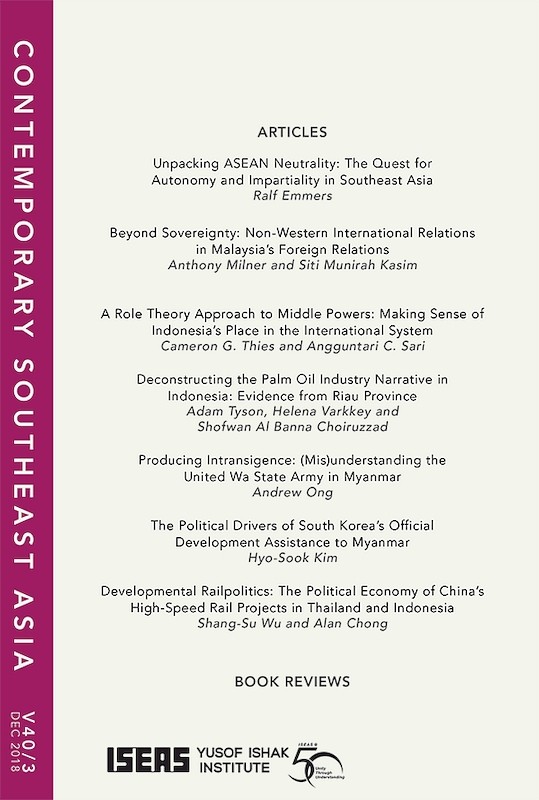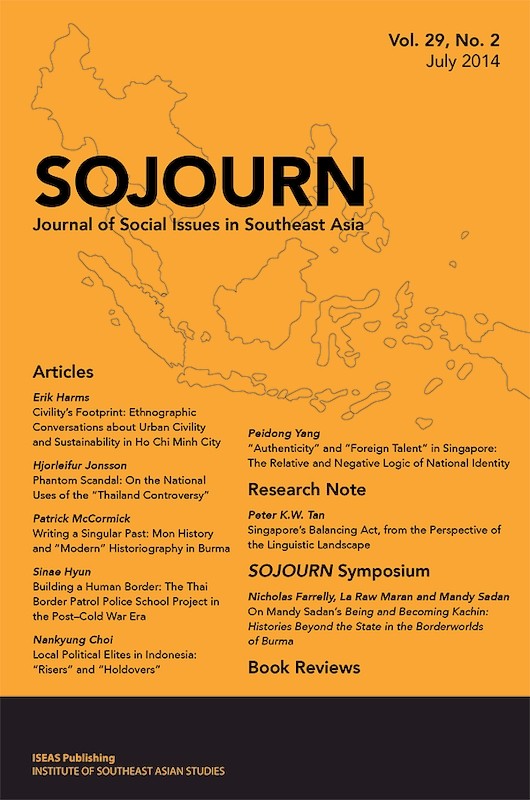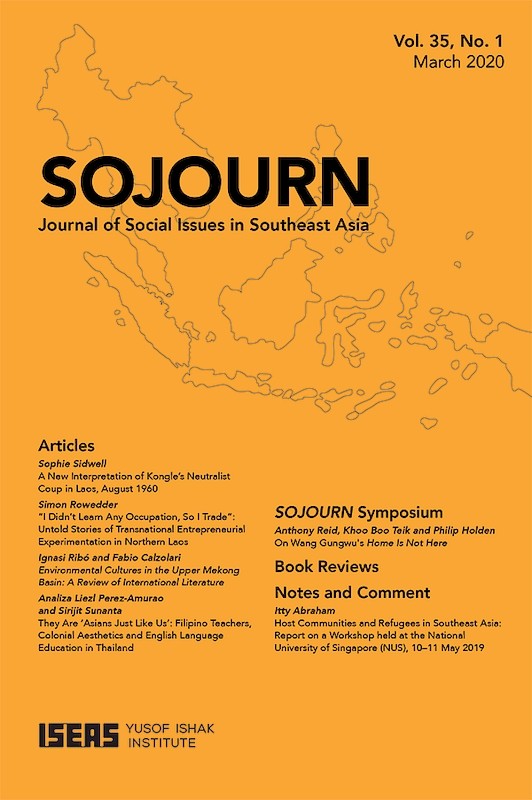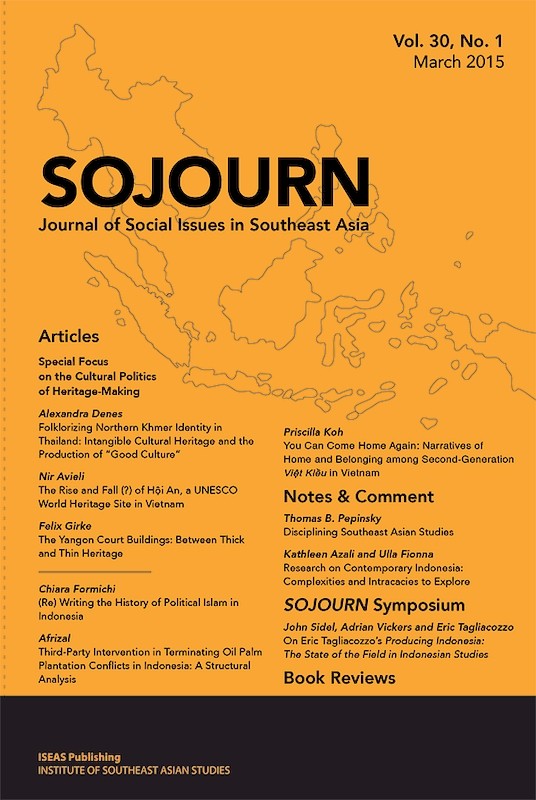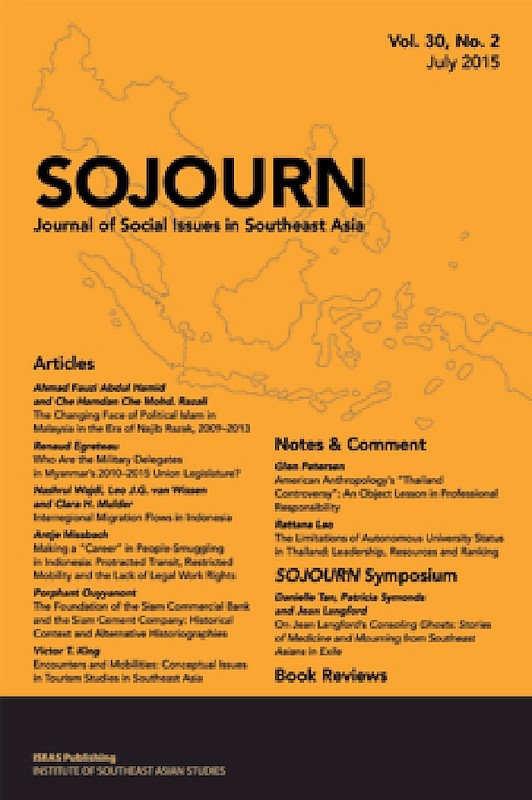Contemporary Southeast Asia Vol. 44/2 (August 2022)
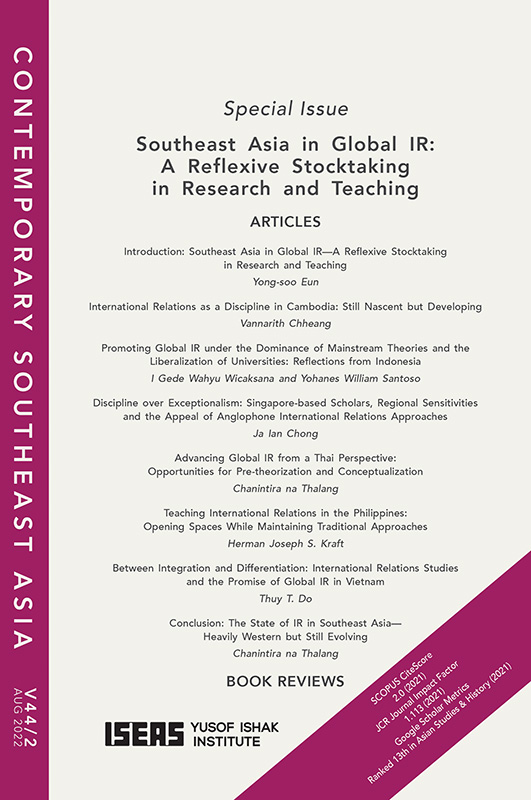
Date of publication:
August 2022
Publisher:
ISEAS – Yusof Ishak Institute
Number of pages:
192
Code:
CS44/2
Soft Cover
ISSN: 0129797X
Contents
-
Contemporary Southeast Asia Vol. 44/2 (August 2022)
[Whole Publication, ISSN: 1793284X] -
Preliminary pages
- ARTICLES
-
1. Introduction: Southeast Asia in Global IR—A Reflexive Stocktaking in Research and Teaching, by Yong-soo Eun, author see abstractMany scholars have devoted a great deal of attention to the problems of West-centrism and American parochialism in the scholarly discipline of International Relations (IR). Few scholars today would dispute the importance of the Global IR project in this regard. Although this intellectual exercise comprises a variety of approaches, the common unifying concern is to promote “greater diversity” in IR knowledge and knowledge production by embracing a wide range of histories, experiences and perspectives, particularly from outside the West. A key question remains: to what extent do we practise what we preach? Accordingly, this special issue takes a self-reflexive stock of contemporary IR research and teaching trends in Southeast Asia. More specifically, it brings together critical scholars living in six Southeast Asian countries—Vietnam, Indonesia, Thailand, Singapore, the Philippines and Cambodia—who have conducted nationwide surveys of their own IR communities and identified how IR is researched and taught in their own countries. Based on the findings of this novel survey, the contributors discuss opportunities and challenges in continuing to encourage greater diversity in the knowledge production of the IR communities of which they are also members. In this way, this special issue presents not only social contexts and institutional constraints, but also autobiographical encounters, both positive (achievements) and negative (frustrations), that the contributors have had in their own IR communities.
-
2. International Relations as a Discipline in Cambodia: Still Nascent but Developing, by Chheang Vannarith, author see abstractThis article examines the development of teaching and research in International Relations (IR) in Cambodia. It argues that IR is a relatively nascent academic discipline, but a growing one. The discipline started to develop incrementally in the 2000s, partially resulting from the internationalization of higher education and growing student demand in the country. This preliminary study finds that mainstream Western theories dominate the discipline in Cambodia and realism is the dominant school of thought within it. Cambodian scholars, nevertheless, have a growing interest in exploring and learning Global IR, especially Asian IR. National experiences and circumstances are the key sources for developing indigenous IR theories, potentially contributing to the debates on Global IR. The publications by Cambodian IR scholars at home and abroad are highly valued by the local academic community. However, the lack of institutional support and research funding constrains IR-related research and publishing in Cambodia.
-
3. Promoting Global IR under the Dominance of Mainstream Theories and the Liberalization of Universities: Reflections from Indonesia, by I Gede Wahyu Wicaksana, Yohanes William Santoso, authors see abstractIn response to the increasing calls for contributions to the Global International Relations (IR) project, this article presents a reflexive study of IR research and teaching trends in Indonesia. It examines the challenges and opportunities to promote Global IR from an Indonesian perspective. The research for this article was conducted via an online survey between August and December 2020, combined with the authors’ personal experiences in research and teaching, as well as secondary sources, especially books and journal articles published by Indonesian IR scholars. The survey finds that constructivism and realism are the most popular theories for Indonesian IR scholars, and positivism is the dominant research principle. In line with these trends, research is more focused on empirically-based and policy-oriented objectives than conceptual ones. Furthermore, universities have been adapting their IR courses to meet the demands of the job market rather than to address the debates in the discipline. Despite these obstacles, the authors have observed that there is a growing interest in non-Western IR discourses in Indonesian IR scholarship, creating the potential to advance Global IR.
-
4. Discipline over Exceptionalism: Singapore-based Scholars, Regional Sensitivities and the Appeal of Anglophone International Relations Approaches, by Chong Ja Ian, author see abstractDespite an association with claims of Asian exceptionalism, the discipline of International Relations (IR) in Singapore tends to reflect approaches common to mainstream Anglophone, North American and, to a lesser extent, British perspectives on the discipline. Intellectual paradigms such as realism and constructivism seem to have a particularly enduring hold on teaching, research and knowledge production, even though the awareness of Global IR and alternative viewpoints is relatively widespread. The reasons for this divergence between statements about a focus on Asia and adherence to more conventional disciplinary norms are varied. The internationalization of Singapore academia, which incentivizes publication in highly-ranked international journals and university presses dominated by Anglophone academia, seems to be a key reason. Other explanations include a need to conform to the preferences of state funders who tend to view the world in policy rather than conceptual terms, and the fact that IR scholars in Singapore predominantly receive their training from parts of the Anglophone world. Limitations on being able to study Singapore in-depth also mean that Singapore-based scholars tend to engage intellectually with work that examines disparate locations outside of the country—even if they are in Asia—rather than systematically consider Singapore’s position in the world.
-
5. Advancing Global IR from a Thai Perspective: Opportunities for Pre-theorization and Conceptualization, by Chanintira na Thalang, author see abstractBased on survey data and reflexive stocktaking, this article examines the status of IR in three areas, namely teaching, research and theory application, with the purpose of understanding the opportunities and challenges with respect to advancing the debates on Global IR from the perspective of Thai academe. While the current state of the discipline reveals many challenges, this article argues that the prospects for progressing the debates on Global IR are contingent on how Thai academics seek opportunities for theory building through inductive reasoning and critically questioning the relevance of mainstream IR theories to local contexts outside the West. Equally important is how Thai IR scholars realize the potential for policy-oriented research to lead to pre-theorization. However, whatever is inferred from these local experiences must offer useful implications beyond national and regional boundaries.
-
6. Teaching International Relations in the Philippines: Opening Spaces While Maintaining Traditional Approaches, by Herman Joseph S Kraft, author see abstractTeaching IR in the Philippines can best be understood in terms of an evolving process that has been significantly influenced by the country’s colonial experience under the United States. The development of the field is largely contextualized as a part of the discipline of Political Science. The latter in turn was situated less as an academic field and more as preparatory course for those pursuing a law degree or a career in the colonial bureaucracy. However, greater attention is now being paid to academic pursuit as an objective of higher education in the Philippines—and the consequent attention to more theoretical research and the teaching of IR as a field of study not completely beholden to the need to produce bureaucrats and technocrats for foreign policy work. There is an increasing diversity in the types of research interests pursued by IR scholars in the country. This diversity ranges from the expansion of the issues being explored to a special focus on widening the theoretical and methodological approaches that local scholars adopt. At the same time, however, the field continues to be embedded in its antecedent purpose of providing training for aspiring diplomats and foreign-policy bureaucrats. The evolution of IR in the Philippines, and the subsequent direction of the field, continue to be influenced by its historical antecedents and its emphasis on a pragmatic appreciation of what needs to be understood through the study of IR.
-
7. Between Integration and Differentiation: International Relations Studies and the Promise of Global IR in Vietnam, by Thuy T Do, author see abstractVietnam’s open-door policy and its proactive international integration since the 1990s have allowed International Relations (IR) to become a popular field of study in Vietnam. Based on the sociology of science framework, combined with in-depth surveys of Vietnamese IR scholars and personal reflections of the author’s experience within Vietnamese IR academia, this article examines the state of the IR discipline as well as the challenges and prospects for advancing Global IR in Vietnam. It argues that while Vietnamese IR scholarship has become more diversified and increasingly integrated with evolving trends in the field, the country’s IR community retains a distinctive and somewhat ambivalent view of the non-Western IR movement due to historical, institutional and political factors. Nonetheless, with its unique position as a postcolonial socialist state that has successfully integrated into international society, Vietnam has great potential in making contributions towards forging a common heritage in the IR discipline.
-
8. Conclusion: The State of IR in Southeast Asia—Heavily Western but Still Evolving, by Chanintira na Thalang, author see abstractBased on cross-national surveys and reflexive stocktaking, this special issue seeks to gain a better understanding of the opportunities and challenges to advancing the debates on Global International Relations (IR) in six Southeast Asian academic communities, namely Cambodia, Indonesia, Singapore, Thailand, the Philippines and Vietnam. Reflecting on various political and socio-economic variables that have shaped the contours of the discipline, it is argued that the primary challenges to advancing Global IR are the dominance of existing mainstream IR theories in teaching and research, and the propensity for scholars based in Southeast Asia to conduct policy- and empirical-oriented research. However, amid these challenges, the contributors have argued that there are some opportunities for the development of Global IR in the region. These include prospects for pre-theorization and conceptualization based on the abundance of empirical-based research, support for familiarizing students with publications by local scholars and constructivism’s growing popularity. Finally, the article proposes some measures to advance Global IR.
- BOOK REVIEWS
-
BOOK REVIEW: Heritage and the Making of Political Legitimacy in Laos: The Past and Present of the Lao Nation, by Phill Wilcox, by Nick J Freeman, author
-
BOOK REVIEW: On Dangerous Ground: America’s Century in the South China Sea., by Gregory B. Poling, by Robert Sutter, author
-
BOOK REVIEW: A Genealogy of Bamboo Diplomacy: The Politics of Détente with Russia and China, by Jittipat Poonkham, by Sittithep Eaksittipong, author
-
BOOK REVIEW: State of Disorder: Privatised Violence and the State in Indonesia, by Abdil Mughus Mudhoffir, by Jajang Jahroni, author
-
BOOK REVIEW: Constitutional Bricolage: Thailand’s Sacred Monarchy vs. The Rule of Law, by Eugénie Mérieau, by Rawin Leelapatana, author
-
BOOK REVIEW: Public Health in Asia during the COVID-19 Pandemic: Global Health, Migrant Labour, and International Health Crises, edited by Anoma P. van der Veere, Florian Schneider and Catherine Yukping Lo, by Azmil Tayeb, author

